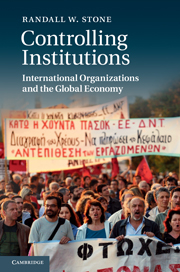1 - Introduction: international organization and US power
Published online by Cambridge University Press: 11 April 2011
Summary
Government is gradually replacing anarchy in the international system, and international governance is largely accomplished by means of international organizations. International organizations have proliferated, have expanded in membership, have acquired new legal enforcement powers, and have extended their reach into the details of domestic political economy in their member states. A few, including the International Monetary Fund (IMF, or the Fund), command significant resources and wield considerable authority. International organizations are emerging as important actors in their own right, but they also remain potent power resources for influential states. The informal power that a leading state can exert through international organizations plays an important role in US foreign policy.
By the beginning of the twenty-first century, international organizations had become an essential instrument of effective statecraft even for the most powerful state in the system, and for most other states under most circumstances, they were the only forums in which anything could be accomplished. International organizations are useful, to powerful and weak states alike, because they can extend credibility and legitimacy to efforts that would otherwise lack credibility and legitimacy. This often makes the difference that makes multilateral cooperation feasible; and the challenges posed by an increasingly interdependent global economy typically demand coordinated responses.
The legitimacy and independence of international organizations are always provisional, because they exist in a system of states, and states enjoy very unequal power resources. In order to assure the participation of the most powerful states, international institutions have developed informal procedures that accommodate their interests.
- Type
- Chapter
- Information
- Controlling InstitutionsInternational Organizations and the Global Economy, pp. 1 - 8Publisher: Cambridge University PressPrint publication year: 2011



